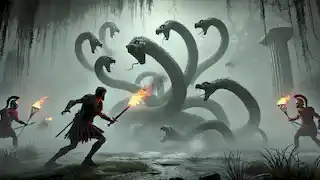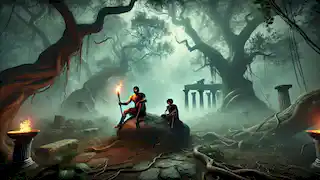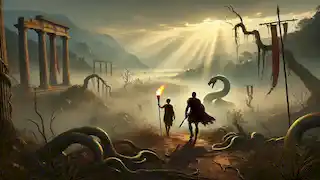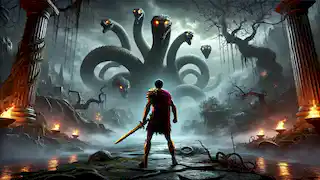In the days when the gods of Olympus still walked among men, when heroes rose to face impossible odds, and the creatures of myth roamed freely through the land, there existed a monster whose very name invoked fear in the hearts of even the bravest warriors: the Hydra. Born from the unholy union of Echidna, the Mother of Monsters, and Typhon, the great terror of the gods, the Hydra was a creature unlike any other. It was a serpent of colossal size, with many heads that writhed and snapped like venomous snakes. Each head was adorned with razor-sharp fangs dripping with venom so potent that a single drop could kill a man within moments.
But the true horror of the Hydra was not in its size or its poison—it was in its ability to regenerate. For every head that was severed from its body, two more would grow in its place, each stronger and deadlier than the last. No mortal had ever managed to defeat the Hydra, and its reign of terror seemed endless. It made its lair in the swamps of Lerna, a murky and foul-smelling marshland where few dared to tread. The very ground was tainted by the Hydra's poison, and the waters of the swamp had turned black and fetid, killing any who drank from them.
The people of the nearby city of Argos lived in constant fear of the beast. It would emerge from its lair to raid the surrounding villages, devouring livestock and spreading death and decay wherever it went. Crops withered in its presence, and the land itself seemed to sicken under the weight of its malign influence. It was said that the Hydra was a curse upon the land, sent by the goddess Hera to punish the people of Argos for their hubris. None could stand against it, and those who tried were never seen again.
The people prayed to the gods for deliverance, but their pleas went unanswered. Hera, the queen of the gods, took great pleasure in the suffering of the people, for it was she who had sent the Hydra to Lerna as part of her vendetta against Heracles, the son of Zeus. Heracles was a demigod, born of Zeus and a mortal woman named Alcmene. His very existence was an insult to Hera, and she sought to make his life as difficult as possible. The Hydra was meant to be an insurmountable obstacle in Heracles' path, one that would finally lead to his downfall.
But Heracles was no ordinary man. He was the strongest of all mortals, gifted with extraordinary power by his father Zeus. From a young age, he had been destined for greatness, and his feats of strength and bravery were already the stuff of legend. He had strangled serpents with his bare hands as a child, and as a man, he had defeated fearsome beasts and completed impossible tasks. Yet despite all his strength, Heracles was not invincible. He had been driven mad by Hera's machinations, and in a fit of madness, he had killed his own wife and children.
In his grief and guilt, Heracles sought redemption. He turned to the oracle at Delphi, who told him that he must serve King Eurystheus of Tiryns for twelve years and complete twelve labors as penance for his sins. These labors were designed to be impossible, for Eurystheus hated Heracles and wanted him to fail. The second of these labors was to slay the Hydra, a task that no mortal had ever accomplished.
With a heavy heart and a steely determination, Heracles set out for the swamps of Lerna. He was not alone in his quest, for he was accompanied by his faithful nephew Iolaus, a skilled warrior in his own right. Together, they journeyed through the treacherous lands surrounding Lerna, passing through desolate villages and barren fields that had been ravaged by the Hydra's presence. The stench of death hung heavy in the air, and the very earth seemed to groan under the weight of the curse.
As they approached the swamps, the sky grew dark with storm clouds, and the wind howled through the twisted trees. The air was thick with the smell of decay, and the ground squelched beneath their feet, threatening to swallow them whole. In the distance, they could see the entrance to the Hydra's lair, a gaping maw of darkness that seemed to beckon them closer.
Heracles gripped his sword tightly, feeling the weight of his task pressing down upon him. He knew that this would be his greatest challenge yet, and that failure would mean not only his death but the continued suffering of the people of Argos. He turned to Iolaus and spoke in a low voice. "Stay close to me," he said. "We must face this beast together, or not at all."
With that, they entered the lair of the Hydra.

The lair was a vast, cavernous space, filled with the stench of rotting flesh and the sound of hissing and slithering. The walls were slick with moisture, and the ground was littered with the bones of the Hydra's victims. In the center of the lair, the Hydra lay coiled, its massive body undulating like a sea of serpents. Its many heads rose up from its body, each one snapping and hissing with malevolent intent. Its eyes glowed with a cold, reptilian intelligence, and its fangs dripped with venom that sizzled as it hit the ground.
Heracles wasted no time. With a mighty roar, he charged at the beast, swinging his sword with all his strength. The golden blade, a gift from the gods, cleaved through the air and severed one of the Hydra's heads in a single blow. But no sooner had the head hit the ground than two more sprang up in its place, each one more vicious than the last.
The Hydra lunged at Heracles, its heads striking like vipers, but the hero was quick. He dodged and parried, his sword flashing in the dim light as he fought to keep the creature at bay. But no matter how many heads he cut off, more would take their place. It seemed that the Hydra was truly invincible, and Heracles began to wonder if he had finally met his match.
But Heracles was not one to give up easily. He knew that brute force alone would not be enough to defeat the Hydra. He needed to be clever, to find a way to stop the heads from regenerating. As he fought, he called out to Iolaus, who had been standing at the edge of the lair, watching the battle unfold.
"Iolaus!" Heracles shouted. "Bring fire! We must burn the stumps, or the heads will never stop growing!"
Iolaus sprang into action, grabbing a nearby torch and lighting it with a piece of flint. As Heracles continued to battle the Hydra, Iolaus ran to his side, using the torch to cauterize the wounds where the heads had been severed. The flames burned hot and bright, and as the stumps were seared shut, no new heads grew in their place.
With this new strategy, Heracles and Iolaus began to gain the upper hand. One by one, the Hydra's heads were cut off and cauterized, until only a single head remained—the immortal head, which no weapon could harm.

Heracles knew that he could not defeat this head with his sword. He needed to find another way to end the Hydra's reign of terror once and for all. And so, with a mighty heave, he lifted the creature's immortal head and carried it to the edge of the lair, where he buried it deep in the earth beneath a massive boulder. There, it would remain for all eternity, unable to harm anyone ever again.
The battle was over, and Heracles had emerged victorious. But the victory came at a cost. The land of Lerna was still poisoned by the Hydra's venom, and it would take years for the earth to heal. The people of Argos would remember the Hydra's terror for generations to come, and the legend of Heracles' triumph would be told around fires for centuries.
{{{_3}}}
Yet even as Heracles returned to Argos to claim his reward, whispers began to spread through the land. Some said that the Hydra's blood, which had seeped into the earth during the battle, was beginning to take root, and that a new Hydra would one day rise to take its place. Others claimed that the creature was not truly dead, but merely slumbering beneath the earth, waiting for the day when it would awaken and wreak havoc once more.
Heracles paid little attention to these rumors, for he had many more labors to complete, each more dangerous than the last. But the people of Greece would never forget the Hydra, and its legend would live on long after the hero had passed into myth.
The swamps of Lerna remained a place of fear and mystery, where few dared to venture. Those who did return spoke of strange sights and sounds—of shadowy figures moving through the mist, and of a hissing that seemed to come from everywhere and nowhere at once. It was said that the Hydra's spirit still haunted the land, and that it would never truly be defeated.

The legend of the Hydra became more than just a story of a monster—it became a symbol of the eternal struggle between order and chaos, between light and darkness. It reminded the people of Greece that no matter how great the hero, there would always be new challenges to face, new monsters to slay. But as long as there were those with the courage to stand and fight, the Hydra would never win.
Heracles' name became synonymous with strength, bravery, and cunning. His victory over the Hydra secured his place among the greatest of Greek heroes, and the story of his Twelve Labors became a symbol of what it meant to be a hero in the face of impossible odds. But while Heracles was celebrated, the Hydra remained a lingering presence in the minds of the people, a dark reminder that even the most fearsome of creatures could never truly be vanquished.
The years passed, and the land around Lerna began to heal. Slowly, the poison that had seeped into the earth began to dissipate, and new life returned to the swamps. But the people still whispered of the Hydra, and the stories of its power grew more elaborate with each telling. Children were warned never to venture too close to the swamps, for fear that the Hydra’s curse still lingered beneath the surface, waiting for the day it could rise again.
But there were also those who sought to understand the Hydra, scholars and mystics who believed that the creature held secrets that could unlock the mysteries of life and death. They ventured into the swamps in search of the creature’s blood, hoping to harness its power for their own purposes. Some were never seen again, while others returned with tales of strange visions and encounters with beings that defied explanation. The Hydra, it seemed, had transcended its physical form and had become something more—a force of nature, a manifestation of the darkness that existed in every corner of the world.

Despite the passing of time, Heracles’ triumph over the Hydra remained a tale of hope and perseverance, a reminder that even the greatest evils could be defeated with courage and cleverness. The story spread far beyond the borders of Greece, carried by travelers and storytellers to lands far and wide. In distant lands, variations of the legend emerged, each one adding new details and interpretations to the story.
In one version of the tale, the Hydra was said to have been a guardian of an ancient treasure, a hoard of gold and jewels hidden deep within the swamps of Lerna. Heracles, in this version, was not just a hero seeking redemption, but a treasure hunter seeking wealth and glory. The battle with the Hydra became a test of greed and morality, with Heracles ultimately choosing to forgo the treasure in order to protect the people of Argos.
In another version, the Hydra was not a monster at all, but a misunderstood creature that had been corrupted by dark magic. Heracles’ task was not to kill the creature, but to lift the curse that had turned it into a beast. This version of the story emphasized the power of compassion and understanding, showing that even the darkest of creatures could be redeemed if given the chance.
But no matter how the story was told, one thing remained constant: the Hydra represented the chaos and destruction that lurked in the shadows of the world, and Heracles represented the light that could banish that darkness. It was a story that resonated with people across cultures and generations, for it spoke to a fundamental truth about the human condition—the eternal struggle between good and evil, order and chaos.
As the years turned to centuries, the tale of Heracles and the Hydra became more than just a story of heroism—it became a myth, a legend that transcended time and space. It was a story that was passed down from generation to generation, a story that shaped the very fabric of Greek culture and influenced the way people understood the world around them.
Even today, the legend of the Hydra continues to capture the imagination of people around the world. It has inspired countless works of art, literature, and film, each one reinterpreting the story in new and creative ways. The Hydra has become a symbol of the challenges we face in our own lives—the obstacles that seem insurmountable, the darkness that threatens to overwhelm us. And just like Heracles, we must find the strength within ourselves to face those challenges, to fight against the darkness, and to emerge victorious.
The Hydra may be a creature of myth, but the lessons of its legend are timeless. It reminds us that no matter how many heads our own personal Hydra may have, no matter how many times we may fall, we can always rise again. For as long as we have the courage to fight, as long as we have the wisdom to seek out new solutions, we can overcome even the greatest of evils.
In the end, the legend of the Hydra is not just a story of a monster—it is a story of humanity’s unyielding spirit, our refusal to be defeated by the darkness. It is a story of hope, courage, and resilience, a story that will continue to inspire generations to come. The Hydra may have been vanquished, but its legend continues to thrive in the hearts and minds of those who hear the tale. From the ancient swamps of Lerna to the farthest corners of the world, the story of Heracles and the Hydra has endured, passed down through the ages as a symbol of the eternal struggle between light and darkness. And as long as there are those who believe in the power of courage and determination, the Hydra will never truly win. Its heads may multiply, its poison may spread, but it will always be met by the strength and ingenuity of heroes who refuse to give in to fear. In every battle, in every challenge, the spirit of Heracles lives on—a reminder that no matter how great the darkness, the light will always prevail.The Legend Lives On


















